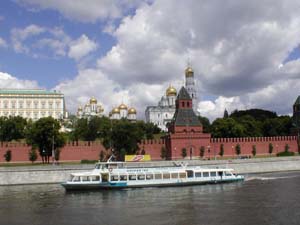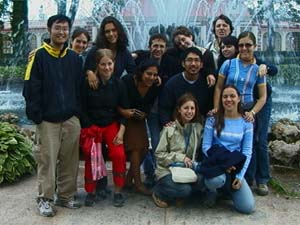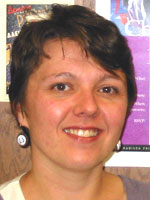Dear Alumni and Friends,
|
|
Welcome to the second in our series of lifelong learning courses on Russia. My name is Jennifer Tishler (MA '93, PhD '99) and I am one of your instructors in this 6-week course. This course--"Imperial Russia"--will cover a historical span just shy of two centuries, from the beginning of the 18th century to the third quarter of the 19th century. We will learn about Russian civilization from the time of Peter I, called "the Great" because of his westernizing reforms and his status as Russia's first emperor, to the Great Reforms of Tsar Alexander II in the mid-19th century. Alexander II, who had been hailed as the "Tsar-Liberator" for his role in the emancipation of the serfs in 1861, would perish in 1881, assassinated by members of a radical group grown disillusioned with the slow pace of reform in Russia. This marked the beginning of the end for Imperial Russia. There is a recurring theme in Russian history of reform and the often violent outbursts engendered by that reform. This is sometimes discussed in terms of the Tocqueville Paradox, named for the French sociologist Alexis de Tocqueville, who observed that the most perilous moment for a bad government is when it seeks to mend its ways.
 |
| Moscow River with Kremlin Cathedrals in background. |
My own interest in Russia stems from another era of "great reforms" that ended poorly for the reformer: the ascendancy of Mikhail Gorbachev as the young (relative to his immediate predecessors), forceful, intelligent new leader of the USSR. My first trip to the Soviet Union took place in the spring of 1987, when Gorbachev's twin policies of "glasnost" (openness) and "perestroika" (restructuring) were being discussed and debated in the U.S. media. Knowing no Russian and practically nothing about Russian history and civilization, I went to Leningrad (as the city was then known) and Moscow as part of a student tour group. Visitors to the USSR from that era will remember the lock-step routine of Intourist, the state tourism monopoly: the long bus rides, the uninspired hotel cuisine, and the numerous forced stops at the Beriozka shops to unload hard currency on candy bars and souvenirs. But something during that week-long visit hooked me, some hint of an intriguing and abundantly rich civilization situated beyond my narrow field of vision.
 |
| Jennifer Tishler at Peterhof with a group of undergraduate students during a 2003 study abroad program in Russia. |
Wanting to know more about Russia, I enrolled in an elementary Russian class when I started college that fall. This led to more classes in Russian literature and history, two more trips to Russia, and eventual graduate study at the University of Wisconsin. I received an MA in Slavic languages and literature in 1993 and a PhD in 1999. From Madison, my husband and I moved to Hanover, NH, where I taught courses in Russian language, literature, and culture at Dartmouth College, frequently leading groups of students on study programs to Russia. We returned to Madison in 2004, and I am currently the associate director of the Center for Russia, East Europe, and Central Asia (CREECA) at the UW-Madison, a job that also allows me to pursue my love of teaching Russian in the Department of Slavic Languages and Literature.
Let me talk a bit about the structure of our class. As a literary scholar, I will be focusing this course on the literature of Imperial Russia. To aid in our understanding of the major societal and cultural trends of this era, I have selected several literary texts: poems, short stories, folk tales, and excerpts from larger essays and novels, such as Tolstoy's War and Peace. (By now you should have received this printed reading packet.) I’ve always been interested in the relationship of history and literature and how imaginative works of fiction can be truthful even if they are not factual in a historical sense. As Jill Lepore writes in a recent article in the New Yorker: "The difference between history and poetry, Aristotle argued, is that 'the one tells what has happened, the other the kind of things that can happen. And in fact that is why the writing of poetry is a more philosophical activity, and one to be taken more seriously, than the writing of history'" (March 24, 2008). [Read the New Yorker article on-line]
In order to provide greater historical context and background information on the major trends in Russian history to be discussed by Professor Petrovich, I will also assign excerpts from the excellent Web site on Russian history produced by the Library of Congress. This historical overview, which will be posted to this site, will serve as our standard history resource.
Now a bit about our weekly schedule. Each Monday I will post an introduction to the weekly topic and my own analysis and overview of that week’s required reading assignments, together with questions for discussion. When I post a discussion question or topic, I would like each student to post a response to the course discussion board. Please limit your responses to around two or three paragraphs. Less is sometimes more, and shorter, succinct responses will allow everyone in the course time to read one another’s work.
On Tuesday (4/22), Professor David McDonald will introduce the first of six television programs on Russian Civilization, featuring Michael Petrovich. Please watch each 30-minute segment, keeping in mind how the main themes relate to that week’s literary reading assignment.
On Thursday (4/24) we will begin to discuss the assigned readings in greater detail and I will post additional discussion topics based on your responses to the readings and to the 1959 Russian Civilization television lectures.
Based on feedback from participants in past lifelong learning courses, I am aiming to keep the amount of time required to participate in this course at a more realistic level. Expect to spend about 1 to 2 hours per week on the course, including reading and viewing assignments and participation in the on-line discussion board.
|
Adobe Flash Player 9 in needed to view this video. (Download) |
Now I will turn the course introduction over to my colleague, David McDonald, chair of the History Department at the UW-Madison. Professor McDonald also holds the Alice D. Mortenson / Michael B. Petrovich Chair in Russian History. David will introduce you to beloved UW history professor Michael Petrovich and to the groundbreaking television lectures he produced in 1959.
Press the PLAY VIDEO button in the adjacent image to begin viewing the short 12 minute presentation. If you do not see an image of David McDonald with the words "Play Video" you will need to download the free Adobe Flash plug-in from their company web site.
http://www.adobe.com/shockwave/download/download.cgi?P1_Prod_Version=ShockwaveFlash
I look forward reading your responses and to getting to know all of you over the next six weeks.
Sincerely,
Jennifer
Jennifer R. Tishler
Associate Director of the Center for Russia, East Europe, and Central Asia
University of Wisconsin-Madison
